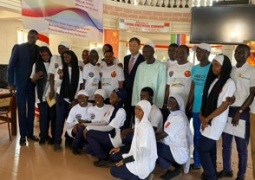
The ceremony attended by stakeholders from different sectors was held at a local hotel on Monday.
Momodou Lamin Njai, head of the school said the move would require upgrading the school into a College of Environment and National Resources which would necessitate upgrading the facilities and equipment to NAQAA approved standard.
Mr. Njai added that once the school is upgraded, it would continue to produce dependable graduates worthy in character and learning capable of contributing in the realisation of balanced ecosystem for advancing the socio-economic development of The Gambia.
According to him, the implementation of the new curriculum will brighten the future prospect of the school and its students in gaining easy access as a continuation of their professional careers into universities, especially the University of The Gambia for degree programmes.
"It will as well integrate new horizons for the Natural Resources sector of The Gambia into one umbrella with a common vision," he said.
He noted that the handing over aims to enhance environmental conservation efforts and address the pressing challenges of climate change, deforestation and biodiversity loss.
Ousainou Touray, project coordinator said the development of a comprehensive and diverse curriculum for the Kafuta Forestry School is an essential step towards achieving sustainable forest management and conservation in The Gambia.
He added that the objectives of the curriculum are multi-faceted and are aimed at addressing the current gaps in forestry education in the country.
He noted that the curriculum has been designed to ensure that students receive holistic education that is both practical and theoretical.
According to him, the curriculum has been designed to cover a range of topics that are relevant to the forestry sector in The Gambia. “The courses are intended to provide students with a solid foundation in the principles and practices of sustainable forest management and conservation, while also equipping them with the necessary technical skills required for effective management of forest ecosystems,” he said.
Dr. Dawda Badjie, executive director at the National Environment Agency (NEA) said The Gambia faces significant environmental issues, including climate change, deforestation and loss of biodiversity.
“These challenges threaten the country’s diverse ecosystem and the communities that depend on them for their livelihoods,” he stated while emphasising the urgent need for sustainable forest management and conservation.
Read Other Articles In National News

Helping Charity provides sponsored students with 91 bags of rice
Aug 21, 2024, 11:05 AM

D1.5M Classroom blocks, computer lab foundation laid at Nyofelleh UBS
Feb 8, 2024, 11:39 AM



